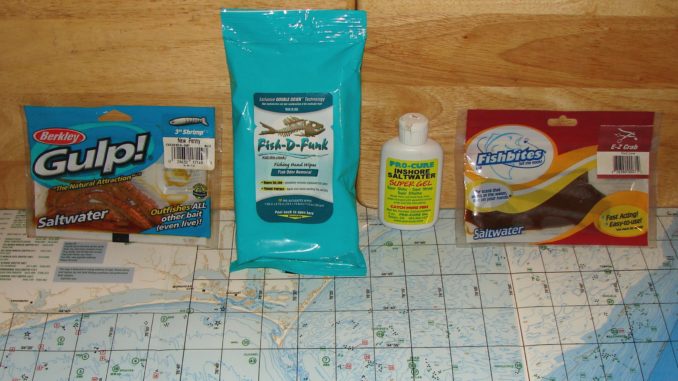
Hide bad scents, but put attractants into play
Much like fine perfumes, scented body wash and “Gee Your Hair Smells Terrific” shampoo, not all odors are bad ones. That’s a very basic and simple way to approach scents, but the truth is that beauty is indeed in the nose of the beholder. Something that smells rotten to one fish may be the perfect dinner invite to another.
The world of scents is just opening up to fishermen. We’ve realized with several species there are scents that definitely attract them. While it might be more difficult to figure out, there are scents that attract other fish, too. The basics of this knowledge has been around for years, but fishermen are searching all aspects of their sport and are beginning to realize that scents can play a major part in attracting or repelling fish.
For years, fishermen have used chum to attract larger predator fish. Some mixtures rely almost solely on scent to attract fish, while some use a mixture of scent and small, edible pieces to add taste. What has not been researched to a significant level until recently is how to remove or neutralize unwanted scents. That’s a big part of scents and this should present some insight.
I’m going to start with something that fishermen need to use but leaves a negative scent. Fishermen are getting better at wearing long pants, long-sleeved shirts, hats and masks, but some body parts still need sunscreen, and I don’t believe anyone would consider it an attractant. If you apply sunscreen with your hands, some will stay on your hands and get on your lures, bait, lines, and other terminal tackle. Do you want that?
Fishermen should use sunscreen, especially one of the “hands-free” versions, or thoroughly clean their hands after each application. Thorough cleaning has become easier and would be worth the effort even if it was difficult. I can’t imagine any fish that would consider even the faintest of traces of sunscreen a desirable scent.
Insect repellent is another necessity that is definitely not a desirable scent. How do you get sunscreen, insect repellent or any other scent off your hands? Washing them isn’t enough; it’s a good start, but not quite enough to remove all the scent.
Last summer at ICAST, a tackle rep I have known for years suggested I go to the D-Funk Wipes booth. D-Funk Wipes (www.D-funkwipes.com) has a line of wipes and sprays that neutralize and counteract odors at the molecular level.
Their wipes piqued my interest enough to check out other things in their line. One of the things that stood out was their Fish Catching Formula wipes. These wipes remove odors, including sunscreen and insect repellent, and leave your hands free of negative odors, including human scent. Fish Catching Formula is bait friendly, and any scent residue on your hands is positive and won’t affect live bait while handling it.
D-Funk has odor eliminating and neutralizing wipes and sprays for use before, during and after fishing, plus cooler- and gun-cleaning formulas and one that tames dog odors. I use their Fish Catching Formula, and while I won’t go as far as to say I have seen a big increase in catch, I’ll say it definitely doesn’t hurt. The fish-odor removal wipes and dog-odor removal wipes work well enough you can see for yourself in one try.
Maybe you can have your cake, sandwich or whatever, and eat it too. Just clean your hands with Fish Catching Formula when you finish and fish will never smell it on your bait and lures.
There are positive scents, too, including the scented baits many manufacturers are producing. Berkley (www.berkley-fishing.com) was one of the first and is the best-known to do this on a large scale. Berkley began incorporating scent into lures in the 1990s with its Powerbait line and has extended its scented baits division to include Gulp and Gulp Alive.
Powerbaits worked pretty well, but sometimes it seems like Gulp baits, and especially Gulp Alive, are some sort of fish crack. You can cut Gulp baits into pieces, and fish will still bite them. The best example of this is using bitten-off and otherwise damaged Gulp baits in minnow and pinfish traps. They fill quickly.
Scents that attract fish aren’t always noticeable to fishermen. Fishbites (www.fishbites.com) was another of the early companies to use impregnated scents. Their baits were developed around scent, and the first ones were simply strips with the scent. About 10 years ago, they began also forming baits into shrimp, paddletail and jerkbait shapes.
I had the pleasure of fishing off Topsail with Dr. Bill Carr, who invented Fishbites. He chartered a boat and took several media types offshore; the only provision was that there could not be any baits onboard other than Fishbites. We caught a wide variety of bottomfish, including grouper and snapper.
At some point, I was talking with Dr. Carr and mentioned that while it was obvious the Fishbites were catching fish, there wasn’t any noticeable odor when they were dry and after they got wet, only a slight smell that didn’t seem like it would be attractive. He said there had been a lot of research on numerous formulas for Fishbites, and the ones that attracted fish best didn’t have a scent noticeable to fishermen until they got wet.
Several scent products can be applied to lures. One of the most prominent of these is Pro-Cure (www.pro-cure.com), a gel that helps it stick to baits. It comes in a wide variety of scents so you can match to what the fish are eating.
Shrimp, mullet, menhaden, crab and inshore saltwater scents all work well. When I’m just guessing where fish might be, I often use crab scent as it seems to spread through the water better, which is true with actual crabs.
Many fishermen say that drum have the best noses in the marsh and can smell sandfiddlers hiding in their holes. Drum, especially red drum, really respond to scents and can occasionally be spotted moving along a scent trail to find a bait. Other inshore fish may not chase scent as aggressively, but a bait that smells good will usually get eaten before one that isn’t as fresh and definitely before one that smells of something unnatural.
As fishermen, we should be aware there are odors, both positive and negative, that can affect our fishing. Hopefully this serves as a primer to make you aware of several things that can be done and several products that can be used to add the right scents and remove the wrong ones.




Be the first to comment